#La fille inconnue
Photo

#adele haenel#la fille inconnue#the unknown girl#2010s#jean-pierre dardenne#luc dardenne#alain marcoen
5 notes
·
View notes
Text
Adèle Haenel, la nouvelle héroïne des frères Dardenne
by Fabienne Bradfer - Le Soir, October 2, 2016
Victoire magazine met with this remarkable actress, the new icon of French auteur cinema.

Adèle Haenel seems like she doesn't always know what to do with her tall body. As we noticed when we went to see her on stage in Harold Pinter's Old Times at the Théâtre de l'Atelier in Paris earlier this year. With her long limbs, she also seems to crash into the world. It’s just the way she is. But in the cinema, she makes use of her nature, transforming herself or calming down. If in life she admits to moving all the time, it is with great pleasure that she slipped into the skin of Jenny, a young doctor, the calm heroine of La Fille inconnue by the Dardenne brothers. About her, the brothers say: Something drew us to her: her body, her movements, her smile…
For Adèle Haenel, featured in Suzanne and Les Combattants in 2014 (which each won her a César, for Best Supporting Actress and Best Actress [respectively]), the Dardennes were certainly on her radar. But she never imagined that one day they would seek her out to film with them. It’s to talk about this experience - incredible and powerful, she says - that we’ve met with her. But also to get to know this remarkable actress, the new icon of French auteur cinema, a little better. She is the girl on a bicycle in Bertrand Bonello's Nocturama, and will soon be starring with Adèle Exarchopoulos in Arnaud de Pallières' Orpheline, presented at the Namur Francophone Film Festival. She also returns to the theater in November with Dennis Kelly's L'Abattage rituel de Gorge Mastromas, with the Compagnie L'Argument. Great promise.
What stayed with you after your Cannes adventure with the Dardenne brothers?
Quite intimate things. Moments of sharing and camaraderie with people I love. It's the first time I've experienced things as a game and that makes things much lighter.
Were you affected by the criticism at that time? Because [the press] blew hot and cold about La Fille inconnue...
Generally speaking, I don't rush into [reading] press reviews. It saves me a lot of stress. Cannes is a place full of enthusiasts where the reactions are not only about the films, but also about the context in which they’re seen. Of course, it's hard to stay sheltered when you do things sincerely and to believe that it doesn't affect you. At the same time, since I don't read things in the moment, it affects me less.
Tell us about your very first meeting with the brothers...
It was at an awards ceremony in Paris. I told them a bad joke, the "embarrassing" kind, and then I went on a date. I thought they were nice and I had approached them without any expectation whatsoever. Because for me, it was inconceivable that we would ever work together. It wasn't possible. I didn't think they were part of the world I could work in.
In France, however, you’re characterized as an icon of auteur cinema and the brothers are part of this new world...
Seen from the outside, our meeting probably seems less surprising. But I can assure you that it was not at all obvious to me. Their cinema was part of my imagination and suddenly it became real. It’s powerful. But there is a real disconnect between how I’m perceived and how I see things. I didn't realize that was the path I was on. Even though all my choices are totally intentional and logical.
When you immerse yourself in the Dardennes’ world, what do you find there?
Working on precision. You can convey your relationship to the world through a particular sensitivity, but also through your way of moving, of interacting with objects. Bluntness, for example, speaks of the way you grew up, of whether or not you take up space in the world. And this holds true, without having to analyze it. In The Unknown Girl, what interested me was building a conscientious and thoughtful character. It’s an austere character. It's the complete opposite of me, I’m pretty brusque and I never stop moving. I talk fast, I seem pissed off all the time. They gave me a character who’s calm. I love it because I'm not actually only angry in real life! It was a way to show that this character is attentive to others. Because The Unknown Girl is about what a personal revolution it is when you’re confronted with otherness. You have to spend time with people, it's the only way to meet them. But this is an era where efficiency is prized. As a result, it’s difficult to make the effort to go through the winning-over process and you spend your time [only] with the people you love. It’s good to slow down sometimes. It allows you to reflect and to break out of your usual patterns. I think you can spend a good part of your life, or even your entire life, without having any idea of what the other is. You can permanently turn people into a mirror of yourself.
Are you in this profession precisely to avoid this and to meet others?
I am passionate about this profession because it’s a dialogue with the world and with life. Connections are a crazy kind of nourishment! Depending on the encounters and the moment when I’m experiencing them, I don't understand the acting in the same way. It's actually subconscious but yes. Films are a précis of the real world in the form of issues addressed through stories. I like to pay attention to the unexpected. That's why I’m in this profession. At one point, I decided that I was putting all my eggs in one basket, I was stubborn but I was also lucky.
Jenny, your character in La Fille inconnue, uses her body to convey speech. Isn't there a bit of that in your acting in general: speaking through the body first?
You’re right. Acting with too much emotivity makes me uncomfortable, because I feel like it's lecturing.
What did you discover while filming with the brothers?
To talk about something in a precise way and without decorum. In La Fille inconnue, it's openness to others. I find that very honest and courageous. I like it when you come and say: We’re saying this and there is no way out. You have to take responsibility.
How does this character, a woman who takes responsibility, speak to you?
For me, she’s a heroine who doesn’t exist, a bit like the Pompidou Center, all the plumbing on the outside. Jenny is like that, she’s the skin turned inside out. Everything I say, I mean. Truth and humanity are in every character, you just have to care about people for it to reveal itself.
Your character tells her intern, you have to be stronger than your emotions. What about being an actress?
Jenny says that but will actually demonstrate the opposite. It's an analytical frame of reference that is shaken up by a new comprehension of the world brought about by feelings. You try to create organized and logical boxes in your life, but you can’t actually live your life with perfect rationality. At times, there are outbursts of emotion. It’s the origin of our humanity. I do this job because I’m afraid and ashamed in real life. Afraid and ashamed of myself, of my inhibitions, of my way of speaking, of what to say or not to say, of not daring or daring too much... Cinema, through its discomfort, forces me to get out of that. It's a breath of fresh air, it does me a lot of good. It forces me to always keep moving without sticking to a particular approach. So you can’t ever relinquish courage. Acting is like strolling around in a miniskirt on Boulevard Barbès on a Saturday night by yourself. You need the same level of continual resourcefulness.
You once said, I make a film to convey a message. Can you confirm this?
Yes, I do. I think it's good to have things to say, otherwise what's the point? To make noise? My objective is to offer a moment of life. Beyond making people change, the important thing is to bring something to life for others. It's a third way compared to entertainment. That’s what springs to mind right now because of what’s happening politically in France. I’m concerned about the fight against the labor law. It's important to express our collective anger. For me, there is a vital concept in acting. And what we produce needs to have meaning and talk about life. We’re not ethereal beings. Acting is about life experiences.
No desire to pick up a camera to express this collective anger?
I want to live. Life isn’t only about cinema. In The Seagull, Trigorin says: I must write, I must write, I must... I rob my choicest flowers of their pollen, pluck the flowers themselves and trample on their roots... He realizes that he is using life as a basis for artistic creation. That's not my thing.
But you will return to the theater.
Yes, with contemporary theater, an English play by Dennis Kelly, The Ritual Slaughter of Gorge Mastromas. It's about choices, politics, how the criterion of utility or social success can at times kill life, even people. Theater is less of a bubble than cinema. The economic stakes aren’t as severe. Theater is a place of research, of discovering texts, of endurance and equality. I love literature and for me, a play is deeply moving when you read it. Theater puts my rage in the right place.
The film industry isn’t an egalitarian environment?
No, it's much more hierarchical and that rubs off on relationships. It's chauvinistic like the world.
And how is the heroine of La Fille inconnue representative of your generation?
There's a kind of torpor in the lack of accountability. Too often we tell ourselves: Someone will take care of it. And I'm part of that. I'm no better than anyone else. I think that many political and human dramas come from this form of torpor. Torpor of intelligence, of humanity... Which allows abuses and horrors. You have to be wary. But Jenny is a character who wakes up.
We will soon see you in Orpheline by Arnaud de Pallières with Adèle Exarchopoulos. What can you say about it?
It's a portrait of a woman. It is the successive shedding of layers to find yourself. I’m very happy with this film. I can't wait for it to be released so I can promote it because I think it's beautiful.
The French press has described you as a female Depardieu. What do you think of this?
It's nice. But we'll have to see. For now, my benchmark is to do things as sincerely as possible. We'll see about the outcome later!
[Please don’t repost this anywhere, in part or in whole. Feel free to reblog, or at least cite your source and provide a link back here. Asking permission would be nice in an ideal world, but I’m a realist - I know far too well how easy it is to appropriate stuff on Tumblr. I would be the first to admit that my translations are not perfect - there are some words and phrases that simply do not drop neatly into an equivalent in English, and I constantly fix typos and make changes or corrections in older posts - but they do take a lot of work and time. Thanks for understanding. - C]
h/t @thexfridax
42 notes
·
View notes
Photo


Is killing someone the only way to be complicit in their death?
(The Dardenne brothers do Haneke...)
- La Fille inconnue, Jean-Pierre & Luc Dardenne, 2016
5 notes
·
View notes
Photo




La Fille inconnue [The Unknown Girl] (Luc Dardenne, Jean-Pierre Dardenne - 2016)
#La Fille inconnue#The Unknown Girl#Luc Dardenne#Liège#Jean-Pierre Dardenne#the Dardenne brothers#drama film#2010s movies#Adèle Haenel#Olivier Bonnaud#Jérémie Renier#France#Louka Minnella#Christelle Cornil#Olivier Gourmet#Fabrizio Rongione#Belgian-French cinema#European movies#Belgian-French movies#European cinema#European society#doctors#Belgium#2010s cinema
9 notes
·
View notes
Text

La Fille inconnue
24 notes
·
View notes
Text
Cinediario 2020 - dicembre
La Fille inconnue (2016) Luc Dardenne, Jean-Pierre Dardenne

1 note
·
View note
Photo

The Unknown Girl (2016) dir. Jean-Pierre Dardenne & Luc Dardenne
20 notes
·
View notes
Photo
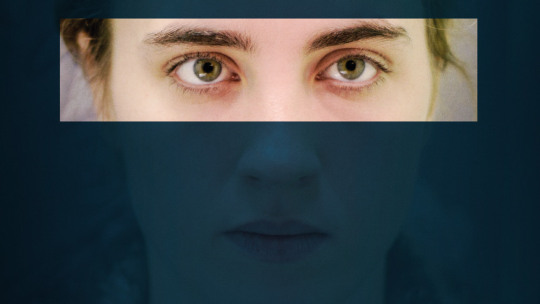
Translated interview
Interview with Adèle Haenel about ‘The Unknown Girl’
der-andere-film.ch, 2016
// Additions or clarifications for translating purposes are denoted as [T: …]. //
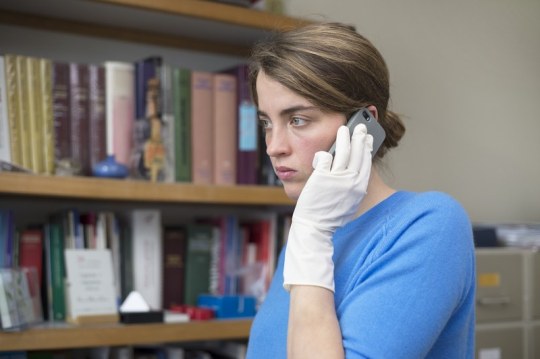
Interviewer: How did you perceive the Dardenne brothers prior to filming ‘The Unknown Girl’ with them?
Adèle Haenel: They are inextricably linked with the history and imagery of contemporary films. I hadn’t seen all of their films before meeting them - which I have done since then! - but I knew a couple of them, ‘The Promise’ and ‘Two Days, One Night’ among others. I did auteur films from the beginning. Considering the importance that the Dardenne have for auteur films, I was of course quite excited, when they asked me to work with them. I didn’t think this would happen to me one day.
I: What was your reaction regarding the screenplay?
AH: I was amazed by the simplicity and depth of the story. The work of the brothers is very precise. They pursue their path until the end and don’t bother with embellishments or any [T: unnecessary] layers. This precision and rigour were already evident in the screenplay.
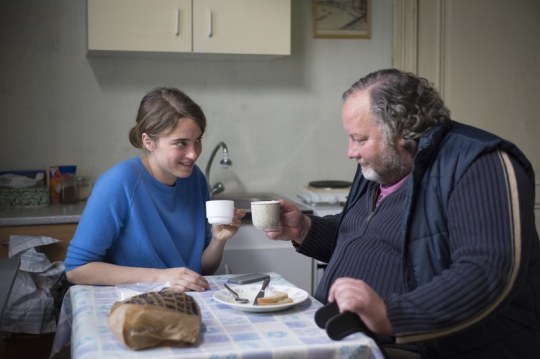
I: How would you describe your character?
AH: She is not an extraordinary heroine and I like that. We don’t really know much about her private life. I think the film tells the story of how Jenny finds her way back to life and ultimately to herself through encountering other people [T: Portrait vibes, also see here]. Jenny is the kind of person who listens and never shows an air of superiority, no matter who she deals with.
I: How did the Dardenne direct you to embody this heroine?
AH: If you get along with a director, then you don’t have to talk too much. I was on the same wavelength as the brothers. The Dardenne don’t bother too much with psychology: For them it’s mainly about the body, about listening and what the characters do. I had to pay attention to things that you could dismiss as details, but that’s not the case: How do I put on my medical glove, how do I inject someone. I was so busy with the ‘doing’ that I didn’t have time to dwell on Jenny’s feelings. You had to avoid interpreting the role or emphasising your intentions. That would have been wrong.
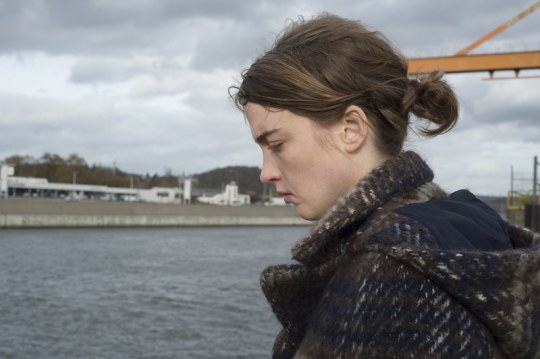
I: As always with the Dardenne, the social environment is very important in ‘The Unknown Girl’.
AH: I like it when cinema is dealing with the present. The social status and living conditions of the characters are fundamental parts of their lives. These determine [T: the characters’] development in life, their trust in themselves and others, their health. In contemporary cinema, there are big gaps when it comes to certain social classes. It is extremely important that certain directors, with the Dardenne front and centre, deal with these questions.
I: The Dardenne like to rehearse extensively with their actors/actresses. How did you experience this period of preparation and the shooting?
AH: Their reputation of driving the actors/actresses to exhaustion by endlessly repeating one shot is a myth. For them, it’s never about performance. I always had the impression that all went very fast. The month of preparation before shooting is quite important. All actors/actresses are gathering then, so that those with only a few scenes immediately feel integrated when it comes to shooting.
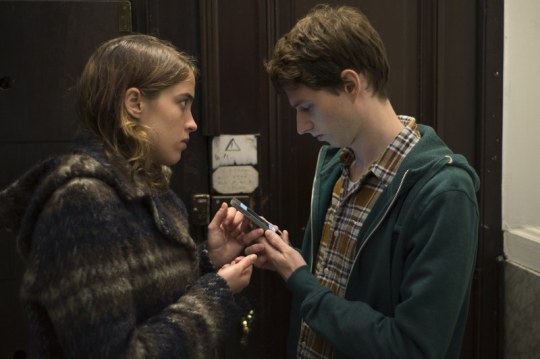
I: What else is happening?
AH: During rehearsal the brothers like to work a lot on the movements of the actors/actresses, on the situations that characters have to deal with, on the camera movements etc. In short, directing essentially starts here. If they encounter a problem, then they can set it aside to find a solution, and don’t have to deal with this obstacle during the shooting. This month of work really freed me from my fears, even though not all the pressure was taken off me.
I: To play a doctor, you had to have certain technical skills.
AH: I had a medical coach for the whole time of preparation: Martine, a real doctor. She taught me how to do certain movements, and told me how to behave towards patients, although there is no magic formula in that area.
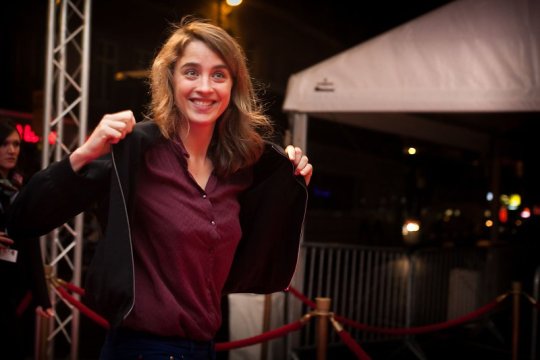
I: What was your takeaway from this adventure?
AH: The Dardenne nurtured my development on a ‘counter-intuitive’ level. They recognised a side of me, which was beyond my rage and anger. The latter are also part of my personality, but they are not everything.
I: You will be presenting ‘The Unknown Girl’ as the lead actress at the Cannes Festival.
AH: The Cannes Festival brings attention to a certain kind of cinema. For these films it is quite important to be shown there. But I’m not most proud of myself. I’m first and foremost proud of the film. If it were not running in Cannes, I wouldn’t be less proud.
youtube
—
📷 [1], [2-5], [6]
#der-andere-film.ch#Adèle Haenel#The Unknown Girl#La fille inconnue#2016#Swiss interview#Her acting was so subtle in this film#Although I didn't quite appreciate it#while watching#My translation#long post
32 notes
·
View notes
Photo


Giving y’all a virtual hug.
#doctor jenny#adèle haenel#la fille inconnue#the unknown girl#adele haenel#nadège ouedraogo#mcgifs#hope y'all are having a good day/night#and if not this one's for you
56 notes
·
View notes
Photo





Adèle Haenel | The Unknown Girl (La fille inconnue)
142 notes
·
View notes
Photo

#adele haenel#la fille inconnue#the unknown girl#2010s#jean-pierre dardenne#luc dardenne#alain marcoen
4 notes
·
View notes
Text
Adèle Haenel: “Je ne veux pas me résoudre au cynisme”
She carries the Dardenne brothers' new film on her shoulders: we met Adèle Haenel for the release of La Fille Inconnue.

By Faustine Kopiejwski - Cheek Magazine, October 10, 2016
If you were to set up a rating system to judge the quality of actresses in interviews, you might imagine a scale that would go from 0 to Adèle Haenel. The lowest grade would be given to those who rehash their promotional speeches like old chewing gum, with a very serious and rather superior air, without questioning the meaning of their ready-made answers. And the highest grade, the "Adèle Haenel" grade, would be given to those who combine the following qualities: intensity, sincerity, reflection, spontaneity, commitment to dialogue and self-deprecation.
Every journalist who has had the chance to meet this demanding and passionate actress generally takes advantage of their introductory text to describe the jubilation they felt when interviewing her, and it makes sense. When you’ve gotten a few "flight hours" under your belt (read: "a few hours spent with your buttocks buried in palace armchairs listening to soft monologues"), sitting next to Adèle Haenel for twenty minutes is like learning to walk again. You have to listen carefully to follow her thought processes, to be prepared to have your questions returned to you, to risk that some of them will be left unanswered for fear of shortcuts. All this in an atmosphere that’s not at all fussy, which makes you feel like you've already changed the world a hundred times with this girl.
This natural closeness is one that Adèle Haenel also maintains with her film characters. From the magnetic Floriane of Naissance des pieuvres to the pragmatic Madeleine Beaulieu of [Les] Combattants, she merges with her roles, totally involved in what she plays, and with what’s at stake. Starring in La Fille Inconnue by the Dardenne brothers, in theaters on Wednesday, she plays Jenny Davin. This young general practitioner, who refuses to open her door to a woman in distress, acts as a police investigator a few days later, when the "unknown girl" who rang her doorbell is found dead. A social film of course, which takes the form of a thriller, conducted with virtuosity and in which the actress is in every shot. Interview.
Did you study your Dardenian heroines before you stepped into Jenny’s shoes?
No, not really. Even though I’ve watched the Dardenne brothers' films before, because anyway they have their own thing. You’d better know that you’re not turning up on the set of Tomb Raider.
Does a leading role with the Dardenne brothers require a particular approach?
It seemed important to not make this character a heroic figure. Because I feel that it's actually her stubbornness that characterizes her. And I find it funny that there’s no justification for this stubbornness, in the sense that it reveals the normal functioning of the world: if someone as relentless as her isn’t in that place, our society completely forgets about people who disappear violently.
In your opinion, why do the Dardenne brothers always make female characters bear such martyrdoms?
(She considers at length.) For the other Dardenne films, I don't know, but at any rate for La Fille inconnue, the question arose as to whether the same thing would have happened with a male character. And in fact, it wouldn't have involved the same relationships between the characters.
What would it have changed, if Jenny were a man?
Already, the way the other characters allow themselves to express violence. The scene with Olivier Gourmet, for example (Editor's note: a tense scene where the character of Olivier Gourmet becomes physically threatening), if I had been a man, would have turned into a fight. If he had had a guy in front of him, his character would have hesitated before raising a hand to him, for fear he would counter. Whereas there, with a woman in front of him, he feels empowered. Putting a female character in that place totally devalues the use of violence. I really like this scene because the basic reflex, if you get slapped, is to give it back. And I think it's too good not to do it. It’s another relationship to the world and to the place we feel we deserve.
Is it the fact that they don’t want to stoop to violence?
Yes, that's it. Violence, at least in this case, is linked to a lack of questioning, to a willful blindness. Olivier Gourmet’s character wants to slap people around because he’d rather not hear what they have to say. And this film is a place where those we don't want to hear about, we're going to talk about them all the time.
Doesn’t it seem like the Dardenne brothers place a particular hope in women?
Yeah, I guess so. Not because there would be a greater feminine sensitivity, but simply because in society, we’re often called upon to be reserved, to observe and to understand things that aren’t expressed. Not by nature - who cares about nature - but by training. We have a certain amount of training in very quickly understanding if a situation is dangerous. Understanding people’s body language, too. Because we have less right to directly express what’s going through our heads when we’re in public.
For you, the Dardenne brothers are making feminist cinema?
Well yes, as long as their cinema isn’t stupid, it’s feminist.
Did you specifically discuss these issues together?
No... But, well, they came looking for me, and they know a little bit about my position.
Jenny's character is a young doctor. She’s very serious, very committed to her work. It's a positive representation, which goes totally against the clichés about youth...
Yes, Jenny's role was rejuvenated because in the beginning it was supposed to be an older character and they couldn't find her during the writing process. They met me by chance and rewrote the role after that. I think it's beautiful, this look at youth. This great seriousness, which leads to the point of great solitude. Dedicating yourself completely to a cause, forgetting yourself in it, not out of sacrifice but just out of seriousness. And by paying a lot of attention to others. It goes completely against the cliché that young people don't give a damn, live for themselves and nobody else.

There’s also the idea that young people can make a difference...
Youth is the moment when you realize that you’ve gone beyond the scope of your education. You’ve been raised with ideals, like Liberté-Égalité-Fraternité, and when you begin to want to apply them, you see the obvious contradiction in the world. Youth is the moment when you say to yourself that all this must still be possible - and youth can last until very late in life, as a result. I don’t want to resign myself to cynicism. For me, meanness and violence are somehow related to apathy. You have to wake people up to themselves. I really believe in that, that’s my faith.
Jenny is driven by guilt. Is this an interesting lever to wake people up?
I don't think that guilt is her driving force, exactly. Because for me, guilt is too big a thing. We’re always guilty: as soon as you take a shower that’s a little too hot, you think of Antarctica. There’s no relation of scale. Whereas this is very concrete: it’s someone who’s in front of your door, and it’s that person that you did not open it for. You’re not being told to save three billion people, just that one. You can't keep shifting your responsibilities onto others: as if the system is moral enough to allow you, as an individual, to rely on it.
Leaving your door closed resonates very strongly right now with the migrant crisis. Were you aware of this political metaphor from the start?
Of course... But it's so huge that I'm going to have a hard time coming up with an answer. Because I don't think you can reduce the current immigration drama to a film. It’s too complex.
In the press kit, you say that the Dardenne brothers perceived something about you beyond your rage and anger. Are you afraid of being stereotyped as a rebel character?
I'm starting to get a bit of a reputation as a pissed off chick. I can feel it's weird to be angry when everything is going well in this business. (She points a finger at the golden columns in the middle of the restaurant) Look, there, the columns are made of gold, everything is fine. I don't agree with the way the world works. I'm not in a cool relationship with things, like “we're going to have fun, we're going to sit by the pool, sunglasses and martinis”, you know what I mean? It's not my thing. But this anger comes from hope, from the faith we were talking about earlier. Faith in the human, in the chance to be part of humanity. So it's still a love thing at the root. And La Fille inconnue, that's exactly it.
[Please don’t repost this anywhere, in part or in whole. Feel free to reblog, or at least cite your source and provide a link back here. Asking permission would be nice in an ideal world, but I’m a realist - I know far too well how easy it is to appropriate stuff on Tumblr. I would be the first to admit that my translations are not perfect - there are some words and phrases that simply do not drop neatly into an equivalent in English, and I constantly fix typos and make changes or corrections in older posts - but they do take a lot of work and time. Thanks for understanding. - C.]
82 notes
·
View notes
Photo


#Cannes2016 - jour 9 : Dolan divise, Adèle Haenel analyse et “Divines” fascine + des pirates sur la croisette | lesinrocksTV
29 notes
·
View notes
Photo



Adèle Haenel smoking on film - 'La fille inconnue' (2016) dir. Luc Dardenne and Jean-Pierre Dardenne
203 notes
·
View notes
Photo




La Fille inconnue [The Unknown Girl] (Luc Dardenne, Jean-Pierre Dardenne - 2016)
#La Fille inconnue#The Unknown Girl#Luc Dardenne#Jean-Pierre Dardenne#the Dardenne brothers#drama film#Adèle Haenel#Olivier Bonnaud#Jérémie Renier#Louka Minnella#Christelle Cornil#Olivier Gourmet#Fabrizio Rongione#Belgian-French cinema#Belgian-French movies#Liège#France#European cinema#European movies#European society#doctors#Belgium#2010s cinema#2010s movies
57 notes
·
View notes
Photo

La Fille inconnue
19 notes
·
View notes